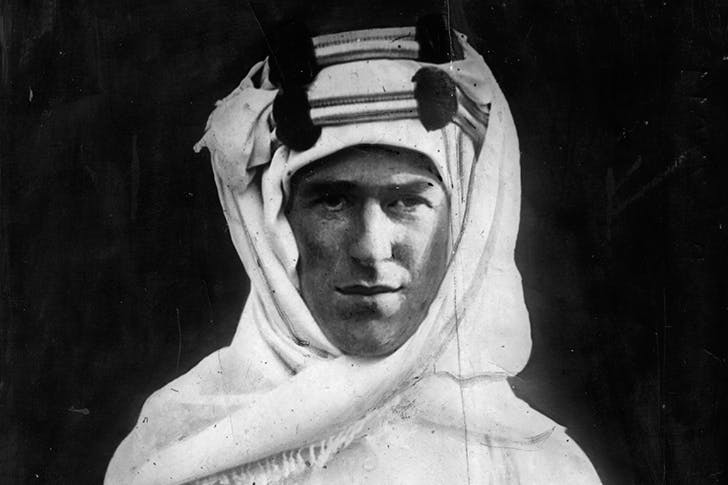The centenary of General Allenby’s capture of Jerusalem falls later this year. On 11 December 1917, the commander-in-chief of Britain’s Egyptian Expeditionary Force entered the city on foot in recognition of the unique sensitivities surrounding the world’s holiest city. War and farce are never too far removed and, as is so often the case on these extraordinarily important moments, the surrender of Jerusalem almost went hilariously wrong. Mounted on horseback and waving a white flag, the city’s mayor offered to hand over the keys to Private Murch, a British cook who had been sent out to find some eggs for his commanding officer. ‘I don’t want yer city,’ the stalwart Murch told the immaculately-turned-out mayor. ‘I want some eggs for my hofficers!’
Lawrence reckoned the Arab Revolt, by comparison with the industrialised slaughter of the Western Front, was the ‘sideshow of a sideshow’, an afterthought of the first world war in the Middle East. Yet the stirring, cinematic story of the guerrilla campaign waged by Lawrence and the camel-bound Arabs on the Ottomans’ Hejaz Railway still captures our imagination. We all love a winner.
Lawrence’s enduring fame — Lawrence of Arabia was the first world war’s answer to the Victorians’ Gordon of Khartoum — can seem a mystery. Gordon and Scott of the Antarctic had plenty of sacrificial derring-do, after all, but they went out of vogue years ago.
Part of the reason for that, perhaps, is that Gordon and Scott’s writing has not aged well. It may also be because in Lowell Thomas, the sensationalist American journalist, and the film director David Lean, Lawrence found skilful and energetic propagandists. Everyone loves a hero in times of war and great national danger, and Churchill was not slow in spotting Lawrence’s potential. It is thanks to Thomas’s completely over-the-top coverage and Lean’s masterpiece Lawrence of Arabia — not to mention Lawrence’s magnificent, troubled, egocentric Seven Pillars of Wisdom — that he manages to live on long after those around him fell out of favour.
One wonders whether the tide will turn against Lawrence some day. For many in the Middle East he has long been the betrayer of the Arabs, witting or otherwise. The failures to date of the Arab Spring — with the honourable exception of Tunisia — have brought into sharp relief the legacy of the Sykes–Picot carve-up of the region by the British and French in 1916. If you are an Arab today, you are unlikely to feel huge affection either for the British record in the Middle East in general or Lawrence’s role in particular.
Yet away from all the shabby politics and bloody battles, for the romantics among us Lawrence’s writing about the scene of his adventures still stands up to literary scrutiny. Sculpted from sandstone and granite, the monumental Wadi Rum valley of southern Jordan brings out the poet in him. He and the Arab tribesmen enter it ‘while the crimson sunset burned on its stupendous cliffs and slanted ladders of hazy fire down its walled avenue’. They fall silent in the face of ‘this processional way greater than imagination’.
Arabs may wince at the memory of Lawrence but just ask those who run Jordan’s tourism industry these days what they think about him and what they make of Lean’s Lawrence of Arabia. In a word, ker-ching!
Got something to add? Join the discussion and comment below.
Get 10 issues for just $10
Subscribe to The Spectator Australia today for the next 10 magazine issues, plus full online access, for just $10.
You might disagree with half of it, but you’ll enjoy reading all of it. Try your first month for free, then just $2 a week for the remainder of your first year.














Comments
Don't miss out
Join the conversation with other Spectator Australia readers. Subscribe to leave a comment.
SUBSCRIBEAlready a subscriber? Log in